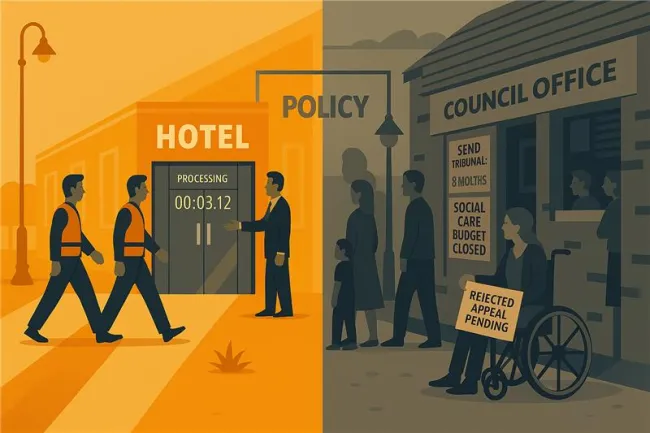
Migration has been an accepted reality in the UK for many years. But as life internally for the people of Britain grows increasingly more difficult, and support increasingly more scarce, has kindness and compassion transformed into virtue signalling and neglect?
There’s a strange logic at work in Britain these days. We’ve become a country where resources are apparently so scarce that local councils can’t house vulnerable adults, children with special needs go without the support they need, and parents are left begging for basic services. Yet somehow, simultaneously, there is an endless stream of public money for people who have only just arrived.
The numbers don’t lie. In 2023–24, the Home Office spent £4.7 billion on asylum support. Of that, £3 billion went on hotel accommodation—equivalent to £8 million per day. Yes, per day. (NAO figures, via EIN)
Meanwhile, over 86,000 family visas were granted in the year to September 2024, an increase of 7%. Those arriving via family reunion routes are often eligible for NHS treatment, housing, and various forms of state support from day one. (Home Office data)
This is happening in a country where the special educational needs and disabilities (SEND) system is underfunded by an estimated £4.6 billion and growing. ([LGA estimate, 2024]) Councils across England are racking up deficits trying to meet statutory obligations to children with Education, Health and Care Plans (EHCPs). The result? Delays, refusals, and families being forced to take legal action just to get their child an education that works for them.
And then there’s social care. If your adult child requires supported living, prepare for a drawn-out assessment process, a fight over eligibility, and a good chance you’ll be told there’s no suitable provision. If your parent develops dementia, you’ll probably be expected to sell the family home before they qualify for help. The message is clear: unless you’re new here, you’ll need to wait your turn.
All the while, hotel bills for new arrivals stack up, the Channel crossings continue (29,884 and counting since PM Starmer took office), and the system creaks under the strain. (Sky News, April 2025) Yes, we’re told that over 24,000 individuals have been “returned”—but a closer look reveals this includes all forms of immigration enforcement, not just those arriving on boats. The net impact? Still rising.
Immigrants arrive in the UK having travelled from a variety of places and for a variety of reasons. But even in the most severe cases of fleeing poverty, war or oppressive cruelty, they arrive from boats to a ship that is already overcrowded for its size and according to much public rhetoric, is sinking. A growing portion of public sentiment is becoming increasingly resistant and in some cases hostile to immigrants. A study showed that despite attitudes in the UK softening during the later period of the 2010s and the country's overall attitude being among the more positive compared to our European neighbours, in April 2023, 52% of people thought that immigration numbers should be reduced. A statistic that has trended through to late 2024 too, illustrating a clear uptick in public concern for the first time since 2016 (The Migration Observatory, University of Oxford, January 2025). While many remain positive about immigration both morally and for the bolstering of the country's work force, with sentiment towards health care workers or other high skill immigrants being seen as especially positive, this reflects a clear and potentially growing resentfulness towards immigration. With our government's careless policy approach to blame.
This isn’t a call for isolation. It’s a call for balance. For sanity. For a government that understands the difference between helping others and abandoning your own. Because at the moment, the priorities are upside down.
The latest data on migration from the Office for National Statistics (ONS) suggest that in 2023: 1.2 million people migrated into the UK and 479,000 people emigrated from it, leaving a net migration figure of 782,000. Representing an overall imbalance of long-term migrants moving into the country. Over the three years leading up to December 2024, net migration totaled nearly 2.4 million. This is the kind of growing imbalance a nation of the UK's size cannot handle for long. Immigration remains an important and vital part of a first-world nation's evolving culture and workflow, but at some point sensibility and reason have to be considered. Governments must recognise and address priorities and concerns. Migration is welcome in the UK, but it must be tempered with greater pacing and reserved control. Care must be given first and foremost to the people already here.
There are children who have been waiting months—sometimes years—for assessments and support. We have people being placed in completely inappropriate accommodation because there’s simply nothing else. Councils pleading for more money just to meet basic legal duties. And yet, there’s always another hotel contract, always another emergency fund, always more to give—just not to the people who’ve actually paid in.
Somewhere along the way, compassion morphed into performative virtue, and fiscal discipline disappeared altogether. The country that once looked after its own first is now running a 24-hour check-in desk for the rest of the world—while asking its own citizens to please be patient.
If we can’t fund supported housing for disabled adults, if we can’t deliver education for children with SEND, if we can’t meet basic social care needs—then we are not in a position to offer open-ended support elsewhere. It really is that simple.
While immigrants undoubtedly contribute to the UK economy and society, and while international obligations must be met, there remains a legitimate concern that the current system too often sidelines the needs of British citizens, creating a growing sense of unfairness among those who have supported that very system all their lives.
This is not about hostility. It’s about priorities. And right now, they are in the wrong order.